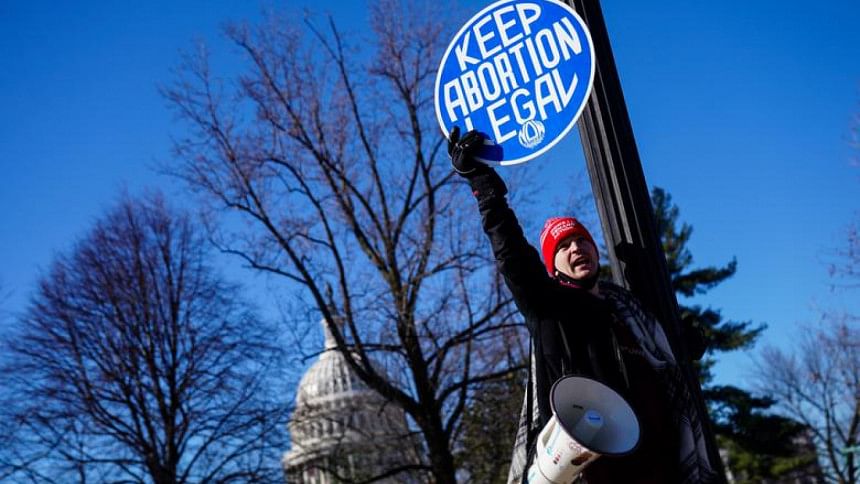Roe vs Wade: The United States' descent to the ‘Dark Ages’

When I was seven, I was visiting a much older sister in Boston, Massachusetts. I was given the run of her small, airy apartment, and in her bedroom, I found a book discreetly tucked away between other inconspicuous titles. It was a large white paperback with a glossy cover and the words "Our Bodies, Ourselves: A Book By and For Women" in bright green over a black and white photo of women demonstrating in the street with the sign "Women Unite." Even though I was an incredibly precocious second grader, I had no idea what this book was about – the title gave me no clue because at age seven, I was wholly comfortable in my skinny little brown body. And I didn't know that, as a female, it was already a battle zone, with various men – and ill-advised women – wanting to legislate control over it.
I naturally didn't understand everything in the landmark book, first published in 1970 two years before Roe vs Wade was passed. It was about women understanding and taking ownership over their bodies, sexualities, and spirits – though that is probably too simplistic a summary. One photo will be forever emblazoned on my psyche and that I would return to several times until I could not anymore. It was a grainy black and white crime scene photo of a young woman named Gerri Santoro, who had died in the process of getting an illegal abortion at the hands of her lover. Her husband was a violent, abusive man and Gerri found refuge in the arms of another. When she found out she was pregnant, she feared her husband would harm her and her daughters. She felt she had no choice but to terminate the pregnancy.
Gerri's naked body was photographed, with her collapsed torso over her kneeling legs, and blood-soaked sheets behind her. She died like that, bleeding out from the catheter that was used to attempt the abortion of her baby. Her lover panicked and left her lying there. She was discovered the next day by a hotel maid. My seven-year-old brain froze on that image of this girl. I stared at it for several minutes, unable to look away. As I got older, I would always go back to the book to learn more. Eventually, I started skipping that image. It caused me inexplicable psychic pain. The raw vulnerability, the nudity, the collapsed torso, the aloneness, the blood seeping into the sheets and carpet underneath Gerri haunts me to this day.
Gerri died in 1964, almost nine years before Roe vs Wade would be passed. The magazine Ms. would publish this photo with the headline "Never Again" underneath it, because that is what the women and male allies of the United States sincerely believed; that the days of back-alley abortions performed with wire hangers and catheters and unsanitary scalpels were well and truly over (Vice, 2016). Roe vs Wade allowed American women to exhale and cautiously hope that a war against us was not going to be waged any longer.
Yesterday, a month after a draft Supreme Court ruling had been leaked concerning the overturning of Roe vs Wade – an unsettling harbinger of how the machinery of justice in the US is failing – the ruling was overturned. My friends and family and, naturally, people on social media, are aghast, enraged, devastated, and terrified because this is about so much more than one law. This means that any law that governs human self-determination is vulnerable. That gay marriage could be overturned, that naturalised citizens could be stripped of their citizenship and deported, that Muslims can be sent to internment camps. Nothing – except, it seems the rights of gun owners – is off limits. This is a precursor to the fall of the empire. I was not surprised. I am still processing. I will resist. However, at this moment, I am also grieving because this particular situation is deeply personal.
For private reasons, I had to terminate a pregnancy, and I did so safely with care. Pro-lifers like to frame pro-choicers as morally bankrupt people who use abortion as a means of birth control. That we end lives with no afterthought. Nothing could be further from the truth. Not a month goes by that I don't think of that baby and what might have been. I would go on to raise a healthy son with my partner and I am deeply grateful that I was given a choice, even though it still hurts that I had to make it.
As I type this, the horror of this ruling is unfolding. The moment Roe vs Wade was overturned, clinics in Louisiana, Oklahoma, and Ohio – among others – were immediately shut down. Almost the moment the ruling was announced, appointments were cancelled, leaving scores of women without recourse – except now maybe the only choice Gerri Santoro felt she had. States are vowing to defy the ruling – while others are gleefully shoving this nation back into the dark ages. The Attorney General of Texas, Ken Paxton, closed his office and is making this dark day an annual holiday while Beto O'Rourke urges Texans to fight it at the polls. In a country that has known a cataclysmic civil war that was in part also about freedom over one's body, we are once again at civil odds, and will continue to be, it seems, for at least my son's lifetime.
Sharbari Ahmed is an author, a screenwriter, playwright, and an educator.

 For all latest news, follow The Daily Star's Google News channel.
For all latest news, follow The Daily Star's Google News channel. 



Comments